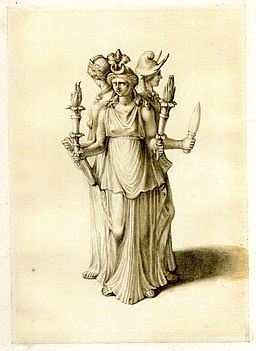
Of Hecate; abundant honour straight
Shall follow on his path, if to that prayer
Gracious the goddess leans and opulence
Attends his footsteps; for the power is hers.”
Hesiod, translated by Sir Charles Abraham Elton, from Theogony
“It keeps eternal whisperings around
Desolate shores, and with its mighty swell
Gluts twice ten thousand Caverns, till the spell
Of Hecate leaves them their old shadowy sound.”
John Keats, from On the Sea
As the Wheel of the Year swirls into late autumn, the energy of Scorpio mirrors the cooling of earth and the slow descent into dormancy. The mood becomes more distant, less fiery and emotional, yet not detached in the way of an air sign. Rather, the sense is of the closeted dampness of inner earth, where mysteries abound and life and death intertwine. Scorpio is self-aware and also cognizant of various realities. During this time of year we survey with wonder the changing colors around us, the dying of what was new last spring, and we are beckoned toward attentiveness to life’s mysteries. It is time for us to feel the energy of that which cannot be seen with the eyes. There is immense power now. Magic abounds. Honor the mystery and learn from it, while protecting your own sense of self. Things are not always what they seem, and differentiation of your spirit among many is a worthy task. I honor the great goddess Hecate as the 2015 patron goddess of Scorpio.
Although Hecate is considered a Greek goddess, Barbara G. Walker in The Woman’s Encyclopedia of Myth and Secrets traces her beginnings back to ancient Egypt, where she was known as Hekat, the powerful goddess of midwifery and magic. Other spellings are Heket and Heqit. Hekat’s powers flowed from the very source of death and creation. As cosmic midwife, she brought spirit into the body and the world of the living. As priestess, she accepted spirit back into the underworld realm at death. Hekat evolved from an even earlier power, the heq or tribal matriarch of pre-dynastic Egypt. The tribal matriarch commanded the sacred mother’s words of power called the hekau. These magical incantations were vital to gain entrance into various areas of the underworld.

May we all be blessed by the healing and reverence of hidden mysteries as bestowed by one of the most ancient goddesses, Hecate. When you look up at the waxing moon tonight and the full moon five days from now, perhaps you’ll think of the moon goddesses of old.
 Cheers & Happy Reading!
Cheers & Happy Reading!
Flossie Benton Rogers, Conjuring the Magic with Paranormal Romance
Loved the post, Flossie. Fascinating that the goddess has so many facets.
I’m glad you enjoyed the Hecate information, Daisy. Thank you.
What I like most about her is that, in Thracian mythology, she is known as the “liberator of women” because she sets women free from the bonds created by man.
She is also considered in Thracian mythology as the the Goddess of Ghosts.
I love that Hecate is the liberator of women and goddess of ghosts. She is amazing. Thanks, Carmen.
I know so little about mythology but it seems like she had many facets to her power and her personality. I found Carmen’s comment interesting that she is also known as the “Goddess of Ghosts” interesting, because that ties in with her rule of the underworld!
She sure did have a lot of facets, Mae, and was associated with numerous other goddesses, which added to her powers. I loved Carmen’s insight too.
Your Posts are always so intriguing! Thanks for another interesting one
Thanks, Cathy!